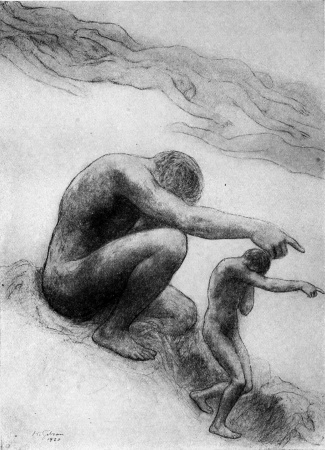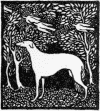The Forerunner, His Parables and Poems
Kahlil Gibran
THE FORERUNNER
HIS PARABLES AND POEMS
BOOKS BY KAHLIL GIBRAN
—AUGUSTE RODIN.
THE MADMAN (1918)
[With three original drawings by the author.]
“His is an irresistible vigor and clarity of thought and feeling, together with a power of simple picturing, which makes it unforgettable. It is the voice and genius of the Arabic people.”—The New York Evening Post.
“Never have I read anything like it, never has a little book brought me so deep and passionate a pleasure. He has breathed the spirit of the East on our cold and indifferent souls; and I, for one, feel almost as if I had been suffocated by the breath of an intense beauty.”—The Liberator.
TWENTY DRAWINGS (1919)
[With an Introductory Essay by Alice Raphael.]
“It is Rodin that comes instantly to mind as a comparison. He has sensed a relation between man and the universe, and, with his astounding technique, is able to make us sense it too. Mr. Knopf is entitled to our gratitude.”—Detroit Journal.
These may be had at all bookshops or from the publisher
ALFRED A. KNOPF
220 West Forty-Second Street
New York

· THE FORERUNNER ·
HIS PARABLES AND POEMS
BY
KAHLIL GIBRAN

NEW YORK ALFRED · A · KNOPF MCMXX
COPYRIGHT, 1920, BY
KAHLIL GIBRAN
PRINTED IN THE UNITED STATES OF AMERICA
CONTENTS
| God’s Fool 9 |
| Love 15 |
| The King-Hermit 17 |
| The Lion’s Daughter 22 |
| Tyranny 26 |
| The Saint 27 |
| The Plutocrat 29 |
| The Greater Self 30 |
| War and the Small Nations 32 |
| Critics 33 |
| Poets 35 |
| The Weather-cock 37 |
| The King of Aradus 38 |
| Out of My Deeper Heart 39 |
| Dynasties 41 |
| Knowledge and Half-Knowledge 44 |
| “Said a Sheet of Snow-White Paper....” 46 |
| The Scholar and the Poet 47 |
| Values 50 |
| Other Seas 51 |
| Repentance 52 |
| The Dying Man and the Vulture 53 |
| Beyond My Solitude 55 |
| The Last Watch 57 |
IN THIS VOLUME ARE RE-
PRODUCED FROM ORIGINAL
DRAWINGS BY THE AUTHOR
You are your own forerunner, and the towers you have builded are but the foundation of your giant-self. And that self too shall be a foundation.
And I too am my own forerunner, for the long shadow stretching before me at sunrise shall gather under my feet at the noon hour. Yet another sunrise shall lay another shadow before me, and that also shall be gathered at another noon.
Always have we been our own forerunners, and always shall we be. And all that we have gathered and shall gather shall be but seeds for fields yet unploughed. We are the fields and the ploughmen, the gatherers and the gathered.
When you were a wandering desire in the mist, I too was there, a wandering desire. Then we sought one another, and out of our eagerness dreams were born. And dreams were time limitless, and dreams were space without measure.
And when you were a silent word upon Life’s quivering lips, I too was there, another silent word. Then Life uttered us and we came down the years throbbing with memories of yesterday and with longing for tomorrow, for yesterday was death conquered and tomorrow was birth pursued.
And now we are in God’s hands. You are a sun in His right hand and I an earth in His left hand. Yet you are not more, shining, than I, shone upon.
And we, sun and earth, are but the beginning of a greater sun and a greater earth. And always shall we be the beginning.
. . . . . .
You are your own forerunner, you the stranger passing by the gate of my garden.
And I too am my own forerunner, though I sit in the shadows of my trees and seem motionless.
GOD’S FOOL
ONCE there came from the desert to the great city of Sharia a man who was a dreamer, and he had naught but his garment and a staff.
And as he walked through the streets he gazed with awe and wonder at the temples and towers and palaces, for the city of Sharia was of surpassing beauty. And he spoke often to the passersby, questioning them about their city—but they understood not his language, nor he their language.
At the noon hour he stopped before a vast inn. It was built of yellow marble, and people were going in and coming out unhindered.
“This must be a shrine,” he said to himself, and he too went in. But what was his surprise to find himself in a hall of great splendour and a large company of men and women seated about many tables. They were eating and drinking and listening to the musicians.
“Nay,” said the dreamer. “This is no worshipping. It must be a feast given by the prince to the people, in celebration of a great event.”
At that moment a man, whom he took to be the slave of the prince, approached him, and bade him be seated. And he was served with meat and wine and most excellent sweets.
When he was satisfied, the dreamer rose to depart. At the door he was stopped by a large man magnificently arrayed.
“Surely this is the prince himself,” said the dreamer in his heart, and he bowed to him and thanked him.
Then the large man said in the language of the city:
“Sir, you have not paid for your dinner.” And the dreamer did not understand, and again thanked him heartily. Then the large man bethought him, and he looked more closely upon the dreamer. And he saw that he was a stranger, clad in but a poor garment, and that indeed he had not wherewith to pay for his meal. Then the large man clapped his hands and called—and there came four watchmen of the city. And they listened to the large man. Then they took the dreamer between them, and they were two on each side of him. And the dreamer noted the ceremoniousness of their dress and of their manner and he looked upon them with delight.
“These,” said he, “are men of distinction.”
And they walked all together until they came to the House of Judgment and they entered.
The dreamer saw before him, seated upon a throne, a venerable man with flowing beard, robed majestically. And he thought he was the king. And he rejoiced to be brought before him.
Now the watchmen related to the judge, who was the venerable man, the charge against the dreamer; and the judge appointed two advocates, one to present the charge and the other to defend the stranger. And the advocates rose, the one after the other, and delivered each his argument. And the dreamer thought himself to be listening to addresses of welcome, and his heart filled with gratitude to the king and the prince for all that was done for him.
Then sentence was passed upon the dreamer, that upon a tablet hung about his neck his crime should be written, and that he should ride through the city on a naked horse, with a trumpeter and a drummer before him. And the sentence was carried out forthwith.
Now as the dreamer rode through the city upon the naked horse, with the trumpeter and the drummer before him, the inhabitants of the city came running forth at the sound of the noise, and when they saw him they laughed one and all, and the children ran after him in companies from street to street. And the dreamer’s heart was filled with ecstasy, and his eyes shone upon them. For to him the tablet was a sign of the king’s blessing and the procession was in his honour.